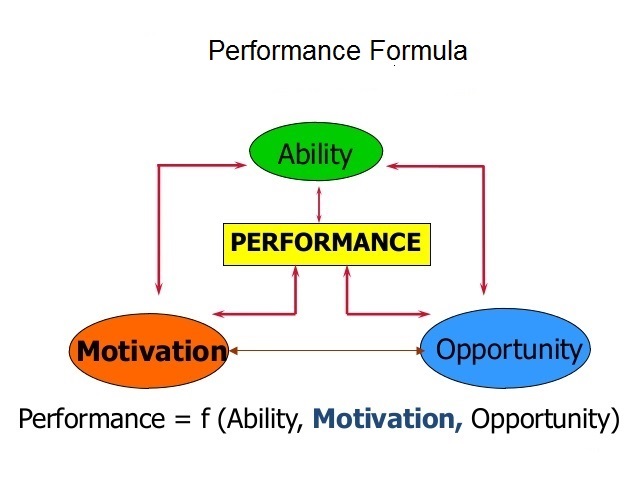Poor performance is a challenging issue for every manager. Diagnosing the root causes of employees' low work performance can help you find the best ways to deal with the problem with the least loss for both sides.
A lot of researches from reputed individuals and organizations indicate that performance is a function of motivation, ability and opportunity.
Below is the formula for performance:

However, the formula seems quite academic. To make it simple, let's take a look at these 4 main causes of poor performance at work:
1. Lack of motivation

It can be clearly seen from our own experience. Personally, many people are working just for the sake of earning money. Passion for work is something luxury to these employees. Overqualified for the position or unfit for the corporate culture also make your employees, especially new hires, downgrade. And the recruitment team should take responsibility in these cases.
Besides, the lack of motivation can result from the organization's policies. The "carrot and stick" approach is a good suggestion in employee performance management. Praises, rewards and recognition programs should be always aligned with corporate core values for the best employee engagement toward the common goals. Strict punishments may backfire on employee performance, so be careful. Sometimes, your staff under-perform because of work overload and stress. I will go into detail in #2 and #3. Managers and corporate HR professionals should work together review performance regularly to timely motivate every individual member.
2. Individual incapabilities

If someone isn't capable of working as expected, there may remain something wrong with his/her skills or needed resources to complete the task. The skill gap can be easily bridged by mentoring, external or internal training if the individual has just been hired, got promoted or job rotation.
As a manager, you should talk to low performers about their work, including the common objectives, their goals and what they expect to have to accomplish their tasks well. Be sure you won't criticize under-performing employees but listen to their problems with care to gain a mutual understanding and trust. After delivering tools and resources to these employees, you need to track and monitor their progress to see if there's a change on their work productivity or not to take further actions.
3. Poor management

The leader has a greater responsibility to the team performance than anyone else. As a leader, you need to understand every member in your team for different managing methods. One of the biggest mistakes that many managers make is "one size fits all" approach.
Setting goals with an employee is essential to boost employee performance which benefits both sides: employee and employer. If the leader can't exactly realize their employees' needs, abilities and expectations, the team will be a mess in its literal sense. A bad leader can turn a high performer into a low one. Reversely, an effective leader can raise the performance of the whole team up to a higher level. Suitable management methods and leadership styles will bring amazing work results.
4. Personal crisis

The good news is most people don't face personal problems regularly. And the bad news is who doesn't have troubles with personal life. Most of us try to keep private and professional stuff separated, but the line between them may become blurred somehow. According to a research by Bensinger, DuPont & Associates, 47 percent of 24,000 surveyed employees say that problems in their personal lives sometimes affect their work performance. Moreover, it can affect the morale of your whole team.
Dealing with employees who are in personal crisis is not a piece of cake as many people think. Obviously, Employee Assistance Programs will help employees in personal crisis, but not all of companies have this kind of program. As a manager, you should empathize with them and give them necessary support for sure. But it doesn't necessarily mean give her/him a hand as a friend. Some days off will help them to reorganize their personal lives without impacting the team performance. You can also let the rest know the problem to win their willing to do extra works in the mean time.
To wrap up, poor performance is the result of employee or/and employer, but it can be fixed in most cases. To enjoy the fruits from high performers, the company need to create and build a culture of accountability for a long-term overall success. It is always a win-win deal!












Replies to This Discussion